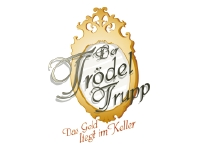The junk troop
| Television broadcast | |
|---|---|
| Original title | The junk troop |
| Country of production | Germany |
| original language | German |
| Year (s) | since 2009 |
| Production company |
Good Times television production company |
| length | 45 minutes |
| Episodes | 702+ in 13 seasons |
| Broadcasting cycle |
Every day |
| genre | Documentary soap |
| Moderation | Sükrü Pehlivan , Mauro Corradino , Otto Schulte , Andreas Bierschock , Marco Heuberg and formerly Antoine Richard |
| German-language first broadcast |
February 22, 2009 on RTL II |
The junk troop - The money is in the basement is a documentary soap from RTL II in which people are supported in making money out of their old items. The moderators are the Ebay appraiser Sükrü Pehlivan , the antiques dealer Mauro Corradino , the household seller and second-hand dealer Otto Schulte , the second-hand dealer Andreas Bierschock , the merchant for antiquarian comic and novel books Marco Heuberg and formerly also the student of psychology and antiques dealer Antoine Richard . In some episodes, the second-hand dealer Detlev Kümmel supports the team of moderators.
The idea of the program Der Trödeltrupp is based on the program Der Trödel-King of WDR television , in which the flea market professional Roland Beuge helped families to sell their no longer needed things at flea markets or at antique dealers .
Sequence of a shipment
In the first phase, the junk expert comes to the person who called him for help. Often this is not the collector himself, but a partner or family member. The junk expert can then show the accumulated things, see how much space they take up in the apartment, house or on the property of the collector and can explain where the things come from, how long they have accumulated and how it came about and how they affect the lives of those affected.
In the second phase, the junk expert sifts through the existing items, whereby a large part of it often turns out to be garbage . A large container is often ordered for this. The collector then symbolically takes the first step by sorting out the first garbage himself and throwing it into the container. The remaining part is often brought into the container by helpers with assistance and supervision (so that valuable objects are not thrown away).
In the third phase, the items collected that were not disposed of as garbage are turned into cash. First, special "treasures" are sold to antique dealers or other collectors. For this purpose, the junk expert has found out about reasonable prices beforehand. Depending on the size or bulkiness of the items in question, interested parties either come to the collector or the collector goes with the junk expert to the potential interested party. Any remaining items are then sold at a flea market, with the junk expert providing advice on both the asking price and the negotiations.
In the fourth and final phase, the junk expert comes to the collector with a scroll, on which all income from the individual sales campaigns - some of which are previously unknown to the collector (in particular the total flea market income) - is listed by item, reveals this to the collector and announces the overall result. Then the junk expert says goodbye to the collector and a cut-out of the before and after situation of the collector's apartment or property is shown.
The celebrity junk squad
The celebrity junk troop is an offshoot of the documentary that was broadcast in 2009, in which, instead of normal people, celebrities turn their old items into cash. These included Mickie Krause , Ross Antony and Molly Luft .
Web links
- Official website at RTL II
- The Trödeltrupp - The money is in the basement in the Internet Movie Database (English)
- The Celebrity Trödeltrupp in the Internet Movie Database (English)
Individual evidence
- ↑ The Junk Squad - The money is in the basement. In: fernsehserien.de
- ↑ Info on episode 43 on RTL II.de
- ↑ Info on episode 84 on RTL II.de
- ↑ RTL2 - The broadcast. Archived from the original on August 2, 2009 ; Retrieved July 25, 2015 .
